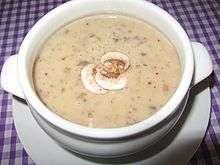Definify.com
Webster 1913 Edition
Soup
Soup
,Soup
,Soup
,Webster 1828 Edition
Soup
SOUP
,SOUP
,SOUP
,Definition 2026
soup
soup
English
Verb
soup (third-person singular simple present soups, present participle souping, simple past and past participle souped)
- Alternative form of sup
Noun
soup (plural soups)
- Alternative form of sup
Etymology 2

(1645) From Middle French soupe, from Old French souppe, sope, from Late Latin suppa (“sopped bread”), from Proto-Germanic *supô (compare Middle Dutch sope (“broth”). See also sop and supper.
Noun
soup (countable and uncountable, plural soups)
- Any of various dishes commonly made by combining liquids, such as water or stock with other ingredients, such as meat and vegetables, that contribute flavor and texture.
- Pho is a traditional Vietnamese soup.
- c. 1430 (reprinted 1888), Thomas Austin, ed., Two Fifteenth-century Cookery-books. Harleian ms. 279 (ab. 1430), & Harl. ms. 4016 (ab. 1450), with Extracts from Ashmole ms. 1429, Laud ms. 553, & Douce ms. 55 [Early English Text Society, Original Series; 91], London: N. Trübner & Co. for the Early English Text Society, volume I, OCLC 374760, page 11:
- Soupes dorye. — Take gode almaunde mylke […] caste þher-to Safroun an Salt […]
- (figuratively) Any mixture or substance suggestive of soup consistency.
- (slang) Thick fog or cloud (also pea soup).
- (US, slang) Nitroglycerin or gelignite, especially when used for safe-cracking.
- (cant) Dope (illicit drug, used for making horses run faster or to change their personality).
- (photography) Processing chemicals into which film is dipped, such as developer.
- (biology) Liquid or gelatinous substrate, especially the mixture of organic compounds that is believe to have played a role in the origin of life on Earth.
- (Britain, informal, often with "the") An unfortunate situation; trouble, problems (a fix, a mess); chaos.
- 1960, P. G. Wodehouse, Jeeves in the Offing, chapter I and X:
- B. Wickham had also the disposition and general outlook on life of a ticking bomb. In her society you always had the uneasy feeling that something was likely to go off at any moment with a pop. You never knew what she was going to do next or into what murky depths of soup she would carelessly plunge you. [...] “It may be fun for her,” I said with one of my bitter laughs, “but it isn't so diverting for the unfortunate toads beneath the harrow whom she plunges so ruthlessly in the soup.”
-
- (surfing) The foamy portion of a wave.
Derived terms
|
|
|
|
Hyponyms
Related terms
See also
Translations
|
|
Verb
soup (third-person singular simple present soups, present participle souping, simple past and past participle souped)
- (uncommon) To feed: to provide with soup or a meal.
- 1904 October, East is East and West is West, in The Vassar Miscellany, volume 34, number 1, page 236:
- "I was so mad, I let him wait half an hour to-night before I souped him."
- (Can we date this quote?), Diza Sauers, Historama, page 152:
- She cooked huge stock pots and souped her dogs once a day.
- 2008, C Mark Chapoton, A Tale of Two Iditarods, page 34:
- I souped the dogs, and went in for a bite. I ended up going back out and making my pups a full meal, then went back in and pigged out myself.
- 1904 October, East is East and West is West, in The Vassar Miscellany, volume 34, number 1, page 236:
- To be in trouble or in difficulty (often passive--cf. in the soup).
- 1922, James Joyce, Ulyssis, II:
- Luck I had the presenee [sic] of mind to dive into Manning's or I was souped.
-
- (photography) To develop (film) in a (chemical) developing solution.
- 1970 December, in The Rotarian, volume 117, number 6, page 31:
- That girl Vivienne, by the way, once worked as a secretary in the workshop of The Rotarian, began "souping" her own snapshots at home, went from there to top rank as a New York color photographer specializing in small children […]
- 1991, Ruth Jean Dale, Society Page:
- "Then perhaps it won't surprise you to learn Annie's taking over the Sunday social column," Roz said. "You photo-guys'll be souping her film."
- 1998, Edward Gorman, Cold Blue Midnight:
- And her camera position had been completely out of his sight. Satisfied that she'd gotten everything she'd needed - much more, in fact - she went back inside and got to work. Jill had souped her first photographs while she'd been on […]
- 2005, Jock Lauterer, Community Journalism: A Personal Approach, page 242:
- By 6 pm Beau and I are back at the paper, souping the film, when Woody rushes into the room.
- 1970 December, in The Rotarian, volume 117, number 6, page 31:
Etymology 3
From Old English supan.
Verb
soup (third-person singular simple present soups, present participle souping, simple past and past participle souped)
Etymology 4
From Old English sweopan.
Verb
soup (third-person singular simple present soups, present participle souping, simple past and past participle souped)
- (obsolete) To breathe out; to draw out.
- (Can we find and add a quotation of Camden to this entry?)
- (obsolete) To sweep.